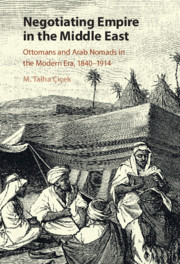
- Cited by 4
-
Cited byCrossref Citations
This Book has been cited by the following publications. This list is generated based on data provided by Crossref.
ÇİFTÇİ, Erdal 2022. 19. Yüzyıl Vanı’nda Âyan Bir Aile: Timurpaşazâdeler. Yüzüncü Yıl Üniversitesi Sosyal Bilimler Enstitüsü Dergisi, p. 68.
ÇİFTÇİ, Erdal 2022. Bir “Âdet-İ Kadime” ve Sadakat Sağlama Yöntemi: 19. Yüzyılda Osmanlı Devleti'nde Aşiret Reisleri̇ne Verilen Hi̇latler Ve Hediyeleşme. HAFIZA, Vol. 4, Issue. 3, p. 118.
AKIN, Tutku 2023. A Literature Review: The Relationship Between the Ottoman Empire and Tribes in the XIXth Century. Türkiye Araştırmaları Literatür Dergisi, Vol. 20, Issue. 40, p. 329.
ÇİFTÇİ, Erdal 2023. Deve, Aşiret ve Devlet: Osmanlı Madencilik ve Ordu Lojistiğinde Aşiret Develerinin Rolü. Iğdır Üniversitesi Sosyal Bilimler Dergisi, p. 148.
- Publisher:
- Cambridge University Press
- Online publication date:
- July 2021
- Print publication year:
- 2021
- Online ISBN:
- 9781108993852
- Subjects:
- Middle East Studies, Area Studies, History, Middle East History




